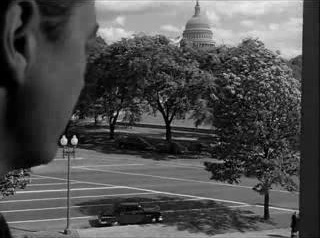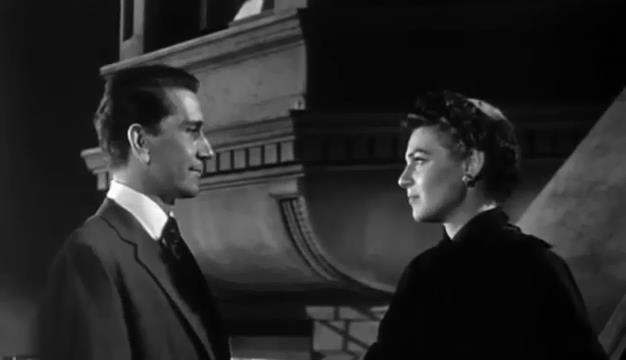The Thief

A spy ring in
Washington, D.C., via New York,
Lisbon, Madrid, Paris, Cairo...
The key figure is
an honored American physicist at the Atomic Energy Commission.
The “silent
service”, it’s called. It ends quite fortuitously, as one should
say (cf. Lévy’s
The Defector).
The
paranoia of surveillance, as later in Coppola’s The Conversation.
Cp. The Human Factor (dir. Otto Preminger). With Ray Milland, a
curious relationship to Billy Wilder’s The Lost Weekend is to be noted. A Hitchcockian
escape to the top of the Empire State Building,
furthermore (even Dial M for Murder
gets into the act). The delights of New York, its Harry
Callahan canyons.
A.W. of the New York Times, “seems highly
improbable.” Variety,
“an
offbeat approach... a good spy plot and a strong performance”.
Leonard Maltin, “gimmick grows wearisome,
script is tame.” Tom Milne, (Time
Out), “one Bresson might have been proud of.”
Halliwell’s Film Guide,
“parts are well done.”
New York Confidential

The Syndicate,
well-ordered, safely ensconced in skyscraper offices with legitimate businesses
and tax write-offs (Brooklyn is slipping) for the national enterprise, is
caught in the light of day by a personal killing that takes in passersby (cf. Out
for Justice, dir. John Flynn) and is answered by a café killing out of
Chicago (cf. The Godfather, dir. Francis Ford Coppola), an attempt at revenge
brings out a state crime commission to catch the top man in the city, Lupo, “I read a lot, I read all the bestsellers,”
a great deal more bribe money must be administered.
“They’re
a buncha crooks, just a buncha
lousy crooks!”
“If Kincaid
ever gets wind of the Washington deal—”
The
motherbound mobster, the mobster’s daughter, the
mobster’s mistress.
Question of a Latin American oil deal tied to U.S. Government loans, Lupo’s got tankers. “Everybody’s got a
price, all you gotta do is find
out what it is.”
The talent from
Chicago is the son of a tough guy, “the toughest”. The slim chance of a rapprochement.
“A
billion-dollar deal!” Sold out to the British and American oil companies, revealed to the
White House (cf. The Houston Story, dir. William Castle).
A
voted hit, a botched job. The
slim chance falls into the talent’s lap, refused it goes smash. Rifts,
hits, “the circle of self-destruction... this is how the cartel works.”
New York Times, “lacks only one thing—real power.”
Variety, “a
tough, no-punches-pulled melodrama.” TV Guide, “a fine, solid exposé on organized crime.” Film4, “seedy
noir... unashamedly grimy”. Halliwell’s
Film Guide, “unexciting”.
With
Broderick Crawford, Born Yesterday
(dir. George Cukor) minus the happy ending (cf.
Scorpio, dir. Michael Winner).
The Fastest Gun Alive
The main
consideration is Henry King’s The Gunfighter. Rouse’s
opening scene has one gunman call out another on his bare reputation. The
tragic view isn’t Rouse’s, he sees the dilemma of a man who tries
to hide his light as essentially comic, the entire structure of the film
expresses this by displacement. There is the false position of the adept as
storekeeper awash in “dresses and candy”, contrasted with the true
position which is relative, as Schoenberg says of Aristotle. The tragedy is
here understood in terms of Mallarmé’s epitaph on Verlaine, “a
scarcely deep calumniated streamlet death.”
By not revealing
the true facts in this case until the final scene, Gilroy and Rouse have set up
an amazing satire. A small boy wearing a kerchief over his face waves a wooden
pistol at George Temple, who surrenders a peppermint stick. The boy’s
dull stare epitomizes the mind of Cross Creek, a fact that places exorbitant
demands on Rouse’s dozen or so top actors. They are required to do little
or nothing in the way of acting, just as Temple tries with great personal
effort to be insignificant at his shop. His nerves are frayed, Vinnie
Harold’s murder of Fallon in Silver Rapids is retold all day long to his
irritation. In a scene with consequences for Rossen’s The Hustler
and Eastwood’s Unforgiven, not to mention Silverstein’s Cat Ballou, he takes up whiskey again
and reveals himself to the town as the fastest gun alive. It takes six hours a
day of practice to do the impossible, he plugs two silver dollars tossed in the
air by two townsmen, shatters a mug of beer dropped from another’s hand.
The barman testifies, no-one ever drew faster, not Wyatt Earp nor the other heroes
and villains he’s seen in his career.
The scene is
prepared early on at a town dance where the merriment, accompanied with violin
and banjo and bass fiddle, is interrupted by common clamor to bring on young
Eric Doolittle for his terpsichorean skillfulness. He hasn’t anything
prepared, so he bobs and shuffles into an athletic number made up as he goes
along. In fact, this is one of M-G-M’s greatest musical scenes, perfectly
filmed, as Russ Tamblyn draws the straight line Ebsen-Kelly-Astaire. Taking
what comes to hand, he picks up two square shovels and “walks” on
their blades as if dancing on stilts. The dance camera gets every bit of his
tumbling, leaping, rope-swinging virtuosity, all of it looking as easy as pie.
It’s partly a device from Minnelli’s The Band Wagon, a
spectacular scene to redress a style of enforced quietude (the New York
Times pointed out a resemblance to Donen’s Seven Brides for Seven
Brothers).
The constraint of
the actors, especially Allyn Joslyn and Leif Erickson as a haughty and a humble
townsman, respectively, is quite a sight. John Doucette as the blacksmith
suffers greatly, Rhys Williams the barman and Virginia Gregg a fickle
dress-buyer carry on, Noah Beery, Jr. as one of Vinnie’s henchmen has a
time (“I hate water,” he says, drinking from a stream ahead of the
posse), John Dehner the other one positively flowers as a master of staid
underplaying suddenly given room to fill the void. Broderick Crawford bears
down in a gruff undertone as nervous Vinnie, Glenn Ford in the lead is reduced
to a showman’s veracity, Jeanne Crain is asked to do absolutely nothing
as Temple’s wife but vainly harp on “peace and permanence”
until Vinnie calls her husband out of church for a showdown, and then her eyes
alone reveal her true feelings, an effect emulated by Lee H. Katzin at the end
of Le Mans, and by Douglas Hickox in Sitting Target, with Jill
St. John.
The apotheosis
takes place at the church. George lays his gun on the pulpit, he and his wife
are leaving Cross Creek. The townspeople voluntarily swear an oath, one by one,
“to Almighty God” that they won’t reveal George’s
secret, lest the town be set upon by challengers as he warns it will, even
though several have already written about it in letters. He is George Kelby,
Jr., son of “the sheriff who cleaned up Abilene,” killed in the
line of duty, teacher of his son. George’s skill is made precise in
abstraction, he has never drawn on a man, it’s not a question of sizing
up an adversary. Vinnie’s gang arrive in town, on the run from a bank
holdup and killing in Yellow Fork. The boy has been left alone to play in the
saloon with his toy pistol, the only one who hasn’t sworn the oath. He
shows Vinnie the two silver dollars, Vinnie’s felt the compulsion to
prove himself ever since “his wife ran off with a faro dealer”. The
townsfolk in church are given five minutes to produce the quick-draw or see
Cross Creek burned to the ground.
Dora Temple sees
her husband as having something “festering inside”, it comes out
now and again like this, forcing them to pull up stakes. Last time he told her
he’d thrown his father’s notched pistol into a lake.
Another man
volunteers in his place, but George goes out to face Vinnie. The exact date of
the shootout is on the grave markers, November 7th, 1889. One of the
coffins is empty save for stones and a pistol, it’s said. That pistol has
been seen to turn up unexpectedly before.
House of Numbers
Rouse, Mankiewicz
and Finney have a conception of justice and complex symbols to express it,
these are extrapolated from San Quentin. A high wall, empty crates, a shallow
grave. Beyond this, a corruptible guard. CinemaScope and Perspecta Sound offer
the field of action.
Brotherly feeling
and wifely solicitude go to great lengths and free a criminal serving
ten-to-life for beating a man to death with his bare fists in a jealous rage,
he is antipathetic to his liberators and, resigned to a life of crime, betrays
them in an anonymous phone call. Recognizing this, and facing prison
themselves, his wife and his brother give him up to spare him the gas chamber
on a subsequent, inevitable charge.
The numbers add
up to a conviction in these sympathetic relatives. Jack Palance plays both
brothers, Barbara Lang the fast-wedded wife, Harold J. Stone the dubious guard,
and Edward Platt the sober warden.
The Oscar
“This is
the night war and politics are forgotten, and we find out who we really
hate.”
The critics
played along by burying the Best Actor nominee in dung and gall, along with the
rest.
Nobody wanted to
see what it was all about, somebody’s idea (three screenwriters and a
novelist) of an artist in Hollywood.
“I’m
talkin’ about art! That’s A! R! T!”